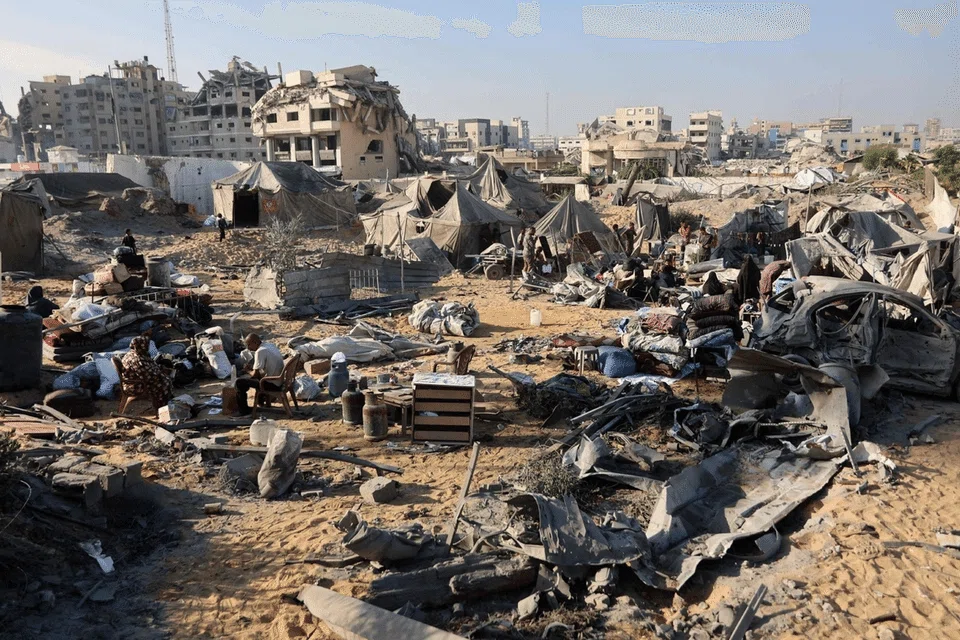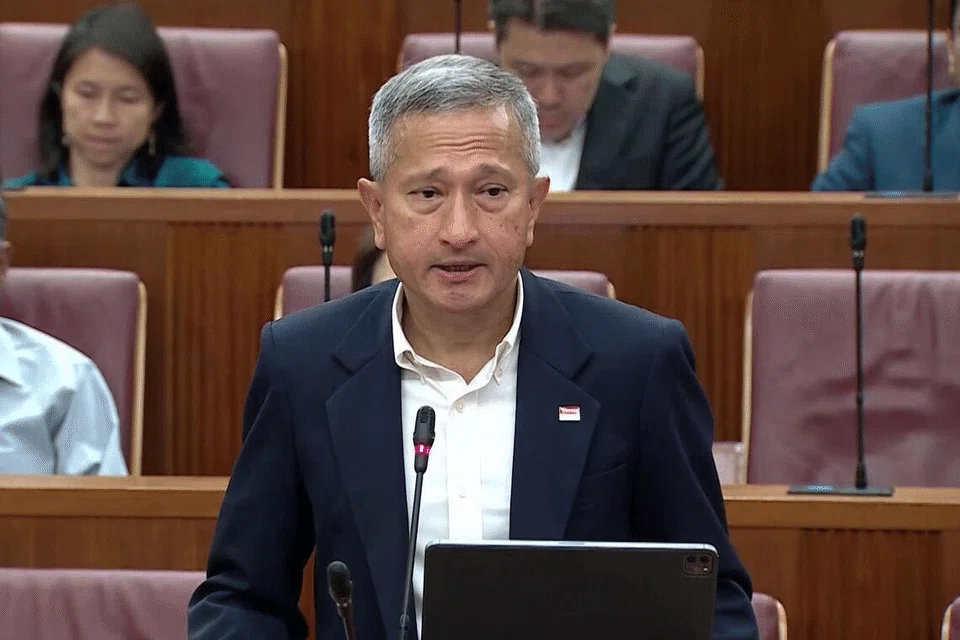Singapore will recognise the state of Palestine when it has an effective government that accepts Israel’s right to exist and categorically renounces terrorism, said Foreign Minister Vivian Balakrishnan on Sept 22.
At the same time, the city-state’s support for a two-state solution means it will oppose any steps by Israel to extinguish or undermine such an outcome, he added.’
“Singapore cannot recognise any unilateral annexation of occupied territory, because this would be a flagrant breach of international law,” he told the House.
With events unfolding quickly, Singapore will continue tracking developments there closely. “If the situation continues to deteriorate, or if Israel takes further steps to extinguish a two-state solution, we will reconsider our position on recognising a Palestinian state.”
As a consequence of Israel’s decision to proceed with building new settlements in the West Bank, Singapore will impose targeted sanctions on the leaders of radical right-wing settler groups that have been responsible for acts of violence against Palestinians there, added Dr Balakrishnan.
In a ministerial statement to Parliament, the Foreign Minister said Singapore has so far maintained its position on recognising a Palestinian state, while doing as much as it can to help the Palestinian Authority strengthen its capabilities.
“Our position today is not if, but when to recognise (Palestine), and we are waiting for that appropriate constellation of factors to be in (place),” he said.
Dr Balakrishnan was replying to 13 questions that MPs had filed on the conflict, including the worsening humanitarian crisis in Gaza and Singapore’s diplomatic efforts to help.
Along with a large majority of United Nations member states, Singapore recently voted in favour of a resolution endorsing the New York Declaration to support a two-state solution.
“The resolution reflected widespread concern that the two-state solution is being eroded by Israel’s actions,” said Dr Balakrishnan, who added that Israel’s conduct of the war in Gaza has sparked renewed efforts by the international community to press the country to change course.
Four nations – Britain, Canada, Australia and Portugal – officially recognised Palestine as a state on Sept 21. This comes ahead of the UN General Assembly taking place in New York this week.
These four countries join more than 140 out of 193 UN member states that recognise a Palestinian state. The US does not, and in Asia, Japan, Singapore and South Korea also do not formally recognise Palestine as a sovereign state.
Dr Balakrishnan noted that a further eight countries are expected to announce the recognition of Palestine later on Sept 22 at the UN.
“Today, a few countries have chosen to change their position and to formally recognise the Palestinian state now, even as the prospects of a functioning state have, in fact, become more remote,” he said.
“They do so precisely to express their grave concern at the status quo, and they hope that this will make it harder for Israel to extinguish a two-state solution altogether.”
Dr Balakrishnan noted that for some of these countries, recognition will be conditional, predicated on the Palestinian Authority’s commitment to renounce terrorism and conduct administrative reform. There is also an expectation – perhaps wishful – for Hamas to disarm and to release all remaining hostages, he added.
The minister said Singapore has consistently affirmed the right of the Palestinian people to self-determination and their own state, as seen in its voting record at the UN.
In 2024 alone, Singapore voted in favour of several resolutions which expressed support for the admission of Palestine as a UN member and affirmed the Palestinians’ right to self-determination.
Dr Balakrishnan said a viable two-state solution is predicated on Palestine’s ability to govern itself, should a permanent ceasefire come into effect.
But first, a unified Palestinian government – one that can exercise effective control in areas including the West Bank and Gaza – will have to be in place.

Noting that there has not been such a government for the last 18 years, he said: “What will happen in Gaza after a ceasefire is unclear.”
It also remains to be seen whether the Palestinian Authority can disarm and displace Hamas from Gaza, he said, adding that Singapore will continue to closely monitor the fulfilment of commitments to renounce terrorism, carry out reforms and disarm Hamas.
Leader of the Opposition Pritam Singh asked whether Singapore risked being seen as anachronistic, given that many of the country’s major trade and defence partners, and the majority of the international community, have recognised Palestine.
He also sought clarifications on the specific principles the city-state is upholding by not recognising the state of Palestine immediately.
Dr Balakrishnan said in response that while all countries want the same thing – peace, and for there to be no terrorism – each will have different thresholds and triggers to take certain diplomatic moves.
He noted that Singapore had, in May 2024, shifted to say it was prepared to recognise the Palestinian state, and it has now said it will do so when there is an effective government that renounces terrorism and recognises the state of Israel.
Singapore has taken its current position due to its complete aversion to terrorism, and to guard jealously its national interests, he added. These are maintaining national unity, protecting Singapore’s security, and compliance with international law.
Singapore has to triangulate between these three interests on every issue, and when there is evident tension between these poles, the PAP government will talk about the issue openly and delicately, he said.
“It means we will not always follow the crowd – many times, we will be in a minority, and we will not be afraid to be in a minority, so long as we understand that we’re taking a stand based on principle (and) to defend our own people’s welfare and security.”
As Palestinians prepare for eventual statehood, Singapore will continue providing them with concrete, capacity-building support efforts, said Dr Balakrishnan.
He noted that more than 800 Palestinian officials have benefited from a $10 million Enhanced Technical Assistance Package, through training in fields such as public administration, digitalisation and public health.
More scholarships will also be awarded to Palestinian students, alongside community policing and leadership programmes.
Dr Balakrishnan called for both Israelis and Palestinians to acknowledge the hard truth that territorial and political compromise is essential if this conflict is ever to be resolved.
Both peoples exist and have claims to a sovereign state in their ancestral homeland, he noted.
“Ultimately, to resolve this longstanding conflict in a comprehensive, just and durable manner, there needs to be a negotiated settlement which results in two states – one Israeli, one Palestinian – with their peoples living alongside each other in peace, security and dignity,” said the minister.
In a Facebook post on Sept 22, Prime Minister Lawrence Wong said Singapore has long supported the Palestinian people’s right to a homeland, and that the only path to a durable peace is a negotiated two-state solution.
“The horrific conflict in Gaza is painful to watch, and emotions run deep. But we must not allow events abroad to divide us here at home,” he said.
As difficult and distant this may now seem, this is the only viable pathway to a lasting peace, he stressed.
On its part, Singapore will continue to support any initiative to resume negotiations between the parties involved towards this goal.
Said Dr Balakrishnan: “As a friend to both sides, we can only hope that in time, there will be the political will and inspired leadership from both sides to enter into direct negotiations on a two-state solution, consistent with the relevant UN Security Council resolutions.”
The Straits Times

